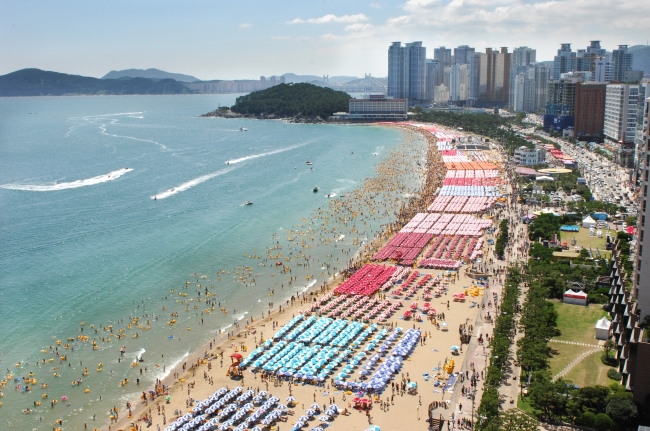The scorching heat and humidity signals that it’s time to get away from daily responsibilities and set off for white sand beaches or lush green mountains.
But summer vacation in Korea is often another round of stressful days. More than half of the population takes summer vacation during late July and early August. Beaches are crowded with endless stretches of colorful parasols. Added to this are congested highways and overpriced restaurants and hotels. The summer fantasy of relaxing on a peaceful white sandy beach often turns into a nightmare.
According to a recent survey by the Ministry of Culture, Sports and Tourism, more than half of the respondents said they plan to take a three-day summer vacation between July 29 and Aug. 4.

Haeundae Beach, Busan, is one of the most popular summer vacation destinations for Koreans, with up to 700,000 tourists visiting per day during the peak vacation season of August last year. A crowded beach scene is common in late July and early August, when more than half of the population takes summer vacations.
The poll of 1,274 people from June 9-12 found that 65.7 percent said they don’t have time for a summer holiday.
“The reason people go on summer vacation in late July and early August is that it’s when schools begin summer break. Parents with children make up the largest portion of vacationers. It’s the only time they can go somewhere with their children,” said Park Sang-cheol, director of the national tourism promotion team of the Korea Tourism Organization. “With half of the population a taking vacation around this time, it’s the most expensive vacation season. You can’t even find a room.”
While children are free from schoolwork, parents find it hard to be completely away from their work.
Lee Sung-tae, a researcher with the Korea Culture and Tourism Institute, said in a 2012 report that the use of holidays is still not considered a right for employees in Korea. While the International Labor Organization recommends employers give three to four weeks of annual holiday, Koreans get 15 days off after completing one year of employment and a maximum of 25 days after working a full 21 years.
Lee found that only 46.4 percent of employees use all of their vacation days. The main reason that prevents them from taking vacations freely is an inflexible and strict work environment and excessive workload. Some employees mentioned they would rather get paid compensation for unused holidays. Some said they can’t leave work as no one can cover for them when they are not around.
Koreans have not always been so averse to vacationing. According to a historic record from the Joseon era, prisoners from the period were allowed to take leave during hottest days of summer. When the temperature and humidity escalated, some prisoners who had committed minor crimes were even released.
Nowadays, more companies encourage employees to take time off as they are increasingly burdened by the compensation they have pay for unused holidays. This is slowly changing vacationing trends in Korea.
Shinhan Bank was among the first to institute a mandatory two-week “refresh” holiday three years ago.
“With the two-week holiday, we can go on longer trips. And employees with children say they have more time to enjoy with their families,” said Shin Jeong-won of Shinhan Bank. Shin went on a 14-day trip to London and Paris this month.
The government is also conducting a campaign that encourages government workers to take one additional day off this summer. It’s part of the effort to revitalize the depressed local tourism sector after the deadly ferry sinking in April.
“Over the long term, what we need is to spread out the demand for a vacation in summer to other seasons,” noted Lee of the KTO.
The government plans to promote a travel campaign that encourages people to travel in spring and fall. To make it work, it will encourage more than 1,500 travel agencies, hotels and restaurants to offer discounts of up to 20 to 30 percent to those who book in September and October.
“A lot needs to be done to make people take vacations throughout the year. Employees should be allowed to take holidays during other seasons. School breaks should be spread out, allowing students to travel with their parents,” said Lee.
By Lee Woo-young (wylee@heraldcorp.com)




![[From the Scene] Monks, Buddhists hail return of remains of Buddhas](http://res.heraldm.com/phpwas/restmb_idxmake.php?idx=645&simg=/content/image/2024/04/19/20240419050617_0.jpg&u=20240419175937)

